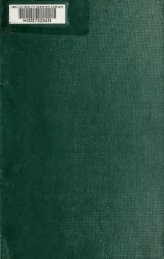The Health bulletin [serial] - University of North Carolina at Chapel Hill
The Health bulletin [serial] - University of North Carolina at Chapel Hill
The Health bulletin [serial] - University of North Carolina at Chapel Hill
You also want an ePaper? Increase the reach of your titles
YUMPU automatically turns print PDFs into web optimized ePapers that Google loves.
I<br />
AuQust, 1927 <strong>The</strong> <strong>Health</strong> Bulletin 17<br />
child th<strong>at</strong> cannot be left somewhere<br />
in quiet, such person ought to feel<br />
the necessity <strong>of</strong> taking up the child<br />
and carrying it or be content with<br />
arriving <strong>at</strong> the destin<strong>at</strong>ion a few<br />
minutes l<strong>at</strong>er in order to let the child<br />
walk along in comfort and safety to<br />
itself.<br />
Such habits are even worse and<br />
more cruel than the old-time practice<br />
<strong>of</strong> some people <strong>of</strong> getting in a buggy<br />
or on horseback and racing their<br />
dogs until the l<strong>at</strong>ter were exhausted.<br />
<strong>The</strong> dog was in much better position,<br />
however, because it could stop any<br />
time it wanted to and lie down and<br />
the master was obliged to come back<br />
and get it or wait for it. And even<br />
where the dog did not have sense<br />
enough to do th<strong>at</strong> it did have full<br />
play <strong>of</strong> all its muscles and was not<br />
dangled from the hand <strong>of</strong> some adult<br />
and jostled through a crowded street<br />
in a position where bre<strong>at</strong>hing is almost<br />
impossible.<br />
We would like to urge th<strong>at</strong> our<br />
readers try this experiment out, or<br />
<strong>at</strong> least to a sufficient extent to observe<br />
the habit prevailing in their<br />
particular vicinity, and to call public<br />
<strong>at</strong>tention to it in order to <strong>at</strong> least<br />
reduce the pi-evalence to a minimum<br />
on behalf <strong>of</strong> the helpless little ones.<br />
TEA AND COFFEE BAD FOR CHILDREN<br />
Sometime ago while taking a meal<br />
<strong>at</strong> a well-known cafeteria in a large<br />
town in <strong>North</strong> <strong>Carolina</strong> we noticed<br />
<strong>at</strong> an adjoining table a man and a<br />
woman with two fairly well-dressed<br />
young children—a boy <strong>of</strong> about 5<br />
and a girl <strong>of</strong> possibly 7. <strong>The</strong> adults,<br />
evidently the parents <strong>of</strong> the children,<br />
had the appearance <strong>of</strong> average intelligence.<br />
<strong>The</strong>y were sufficiently sunburned<br />
to indic<strong>at</strong>e more or less an<br />
outdoor life. Wh<strong>at</strong> <strong>at</strong>tracted our <strong>at</strong>tention<br />
to the group was, first, the<br />
rucus the two young ones were raising<br />
on account <strong>of</strong> not being supplied<br />
with something they wanted with<br />
their meal. <strong>The</strong> other condition was<br />
the apparent pallor which was evident<br />
even bene<strong>at</strong>h the sunburn, and<br />
also the extreme whiteness <strong>of</strong> the<br />
eyes and the pale bloodless lips <strong>of</strong><br />
the children. <strong>The</strong>y kept up their<br />
commotion and the parents evidently<br />
yielded to their insistence in order<br />
to avoid the increasing <strong>at</strong>tention<br />
given them from the other diners<br />
about in the room, by calling a waiter,<br />
who, after a whispered convers<strong>at</strong>ion,<br />
went to the serving shelf and returned<br />
with two steaming cups <strong>of</strong><br />
hot c<strong>of</strong>fee. <strong>The</strong>y refused to have any<br />
milk in the c<strong>of</strong>fee, but with plenty<br />
<strong>of</strong> sugar seemed perfectly happy and<br />
content. <strong>The</strong>y drank their c<strong>of</strong>fee to<br />
the dregs with apparently as much<br />
relish as any old toper ever did his<br />
bottle <strong>of</strong> handout.<br />
Whether or not the children had<br />
hookworm, malarial infection, or<br />
other troubles, there is no way <strong>of</strong><br />
knowing. Whether or not their appetite<br />
for the stimulant in the c<strong>of</strong>fee<br />
was a result <strong>of</strong> disease we do not<br />
know. Whether or not the consumption<br />
<strong>of</strong> c<strong>of</strong>fee regularly was producing<br />
the untoward symptoms we do<br />
not know; but we strongly suspect<br />
th<strong>at</strong> to be the case.<br />
It cannot be written too many<br />
times or repe<strong>at</strong>ed too <strong>of</strong>ten th<strong>at</strong> tea<br />
and c<strong>of</strong>fee (and this includes also the<br />
abominable iced tea) is bad for young<br />
children. <strong>The</strong> active principle in tea<br />
and c<strong>of</strong>fee is an alkaloid known as<br />
caffeine. One cup <strong>of</strong> hot steaming<br />
c<strong>of</strong>fee may contain as much as two<br />
or three grains <strong>of</strong> this alkaloid. <strong>The</strong><br />
ordinary dose given by doctors, in<br />
combin<strong>at</strong>ion generally with other<br />
drugs, is somewhere between a minimum<br />
<strong>of</strong> one-quarter grain and the<br />
maximum <strong>of</strong> one grain for adults. In<br />
addition to the damage done to children's<br />
nervous system, to their digestive<br />
system, to their blood system, and<br />
to other tissues in their body by the<br />
excessive stimul<strong>at</strong>ion <strong>of</strong> caffeine consumed<br />
in c<strong>of</strong>fee or tea, both c<strong>of</strong>fee


![The Health bulletin [serial] - University of North Carolina at Chapel Hill](https://img.yumpu.com/33495252/247/500x640/the-health-bulletin-serial-university-of-north-carolina-at-chapel-hill.jpg)
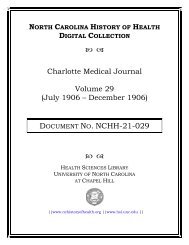
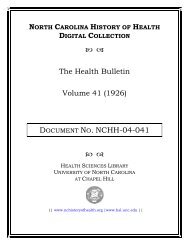
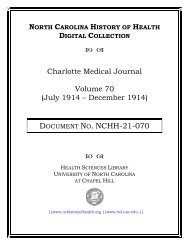
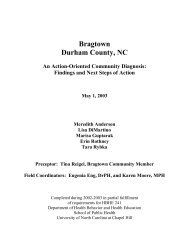
![Bulletin of the North Carolina Board of Health [serial] - University of ...](https://img.yumpu.com/48032016/1/153x260/bulletin-of-the-north-carolina-board-of-health-serial-university-of-.jpg?quality=85)
![The Health bulletin [serial] - University of North Carolina at Chapel Hill](https://img.yumpu.com/47603625/1/169x260/the-health-bulletin-serial-university-of-north-carolina-at-chapel-hill.jpg?quality=85)
![The Health bulletin [serial] - University of North Carolina at Chapel Hill](https://img.yumpu.com/47242858/1/169x260/the-health-bulletin-serial-university-of-north-carolina-at-chapel-hill.jpg?quality=85)
![The Health bulletin [serial] - University of North Carolina at Chapel Hill](https://img.yumpu.com/43204263/1/172x260/the-health-bulletin-serial-university-of-north-carolina-at-chapel-hill.jpg?quality=85)
![The Health bulletin [serial] - University of North Carolina at Chapel Hill](https://img.yumpu.com/41981074/1/163x260/the-health-bulletin-serial-university-of-north-carolina-at-chapel-hill.jpg?quality=85)
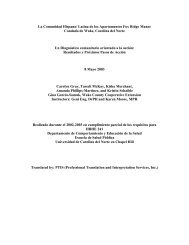
![The Health bulletin [serial] - University of North Carolina at Chapel Hill](https://img.yumpu.com/40912928/1/164x260/the-health-bulletin-serial-university-of-north-carolina-at-chapel-hill.jpg?quality=85)
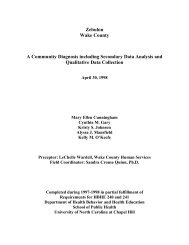
![The Health bulletin [serial] - University of North Carolina at Chapel Hill](https://img.yumpu.com/35643061/1/167x260/the-health-bulletin-serial-university-of-north-carolina-at-chapel-hill.jpg?quality=85)
![Biennial report of the North Carolina State Board of Health [serial]](https://img.yumpu.com/34024350/1/166x260/biennial-report-of-the-north-carolina-state-board-of-health-serial.jpg?quality=85)
